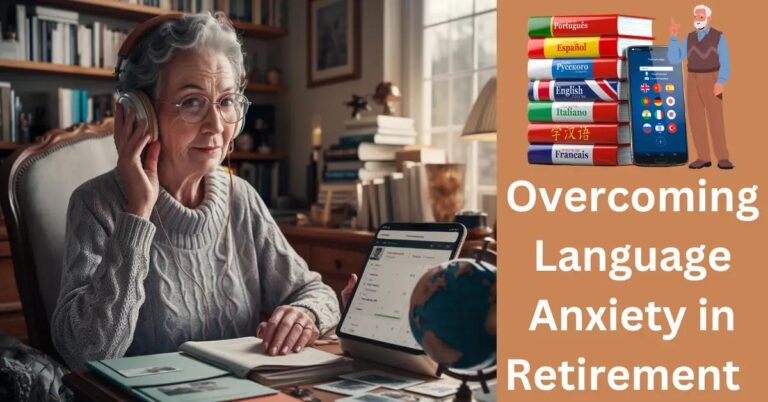TL;DR:
- Retirees commonly face language barriers due to hearing and memory decline and non-native language challenges.
- Solutions:
- Language Classes: Tailored for seniors, focusing on everyday vocabulary.
- Technology: Translation apps (e.g., Google Translate, Microsoft Translator) and speech-to-text features.
- Community Support: Social clubs, community centers, peer mentorship programs.
- Resources:
- Online platforms (e.g., Duolingo, Babbel), libraries, community centers, and educational institutions.
- Professional interpreters and language therapy services.
- Healthcare: Access to interpreters, multilingual written materials, culturally sensitive staff training, and real-time translation tools.
- Cognitive Benefits: Improved memory, problem-solving, delayed dementia, enhanced social interaction, and boosted self-confidence.
Overall, combining various methods can help retirees overcome language barriers, enrich their social lives, and optimize their health outcomes.
Retiring abroad is an exciting adventure, but it brings its own set of challenges. One major hurdle? Language barriers. In “Language Barriers and Solutions for Retirees: What Works?”, I will discuss common language issues retirees face and real solutions to overcome them. From tech tools to community support, learn how to navigate language hurdles and thrive in your new home. Ready to make your retirement smoother? Let’s dive in!
What Language Challenges Do Retirees Face?
Retiring in a new country can be exciting but also tough. Language issues present common obstacles for older adults. As we age, our hearing and memory may decline, making communication harder. These physical changes can lead to misunderstandings during conversations.
Non-native retirees face another layer of difficulty. Imagine moving to a country where you don’t speak the local language. Everything from buying groceries to visiting the doctor becomes a challenge. These retirees need to adapt quickly to a new way of life.
Cultural nuances add to the complexity. Every culture has unique communication styles that can be hard to grasp. For example, some cultures value direct communication, while others may use more subtle hints. Retirees need to understand these differences to connect better with locals.
Language barriers also create emotional strain. Feeling isolated or misunderstood can affect mental health. Retirees might struggle to make new friends, leading to loneliness. Poor communication can also cause stress in everyday interactions.
What can we do to help? Solutions exist to ease these struggles. Offering language classes tailored for seniors is one approach. These classes usually focus on practical conversation skills and everyday vocabulary. They allow retirees to practice speaking in a supportive environment.
Technology can also lend a hand. Translation apps provide quick help for understanding and speaking a new language. Some apps even offer speech-to-text features, which are useful for those with hearing loss. These tools make daily tasks more manageable.
Community support is crucial. Social clubs and community centers offer chances to engage with locals. Interaction in such settings leads to better language skills and reduces feelings of isolation.
In summary, retirees face various language barriers that affect their daily lives. From physical challenges to cultural nuances, these obstacles are real but surmountable. By combining language classes, technology, and community support, we can help retirees overcome these issues and enjoy a fulfilling retirement.
How Can Retirees Overcome Language Barriers?
Retirees can face many language barriers. Here are some ways to help overcome them.
Utilizing Technology
One way to ease language problems is technology. Translation apps can translate words in seconds. Examples are Google Translate and Microsoft Translator. These apps can turn speech into text. They also translate messages instantly. This makes it easier to talk to others. Some even work offline, which helps in places with no internet.
Professional Services
If you need more help, professional services are an option. Hiring interpreters and translators can make a big difference. They are trained to help with complex talks. This can be very useful in doctor visits or legal meetings. Many agencies offer these services. Some are also available online, which can be handy.
Enrolling in Language Classes or ESL Programs
Taking language classes is another good step. Many community centers offer ESL (English as a Second Language) programs. These classes are often low-cost or even free. They teach basic language skills needed for everyday life. For those looking to continue learning, some colleges offer courses too.
Community Events and Social Clubs
Engaging in community events and social clubs can help you practice. Many areas host language cafes or conversation groups. These gatherings provide a relaxed place to speak and listen. Joining a senior club that focuses on language learning can be both fun and educational. Interacting with peers who are also learning makes it easier and more enjoyable.
Each of these options has its own benefits. For example, while technology is good for quick translations, professional services provide more accurate help. Language classes teach at a steady pace, but community events offer real-world practice. It’s good to mix different methods to find what works best for you.
For more information on using technology to tackle language barriers, you can visit this helpful site.
Using multiple strategies can make overcoming language barriers less of a challenge. Trying these methods can make your retiree life more enjoyable and less stressful.
What Language Learning Resources Are Available for Retirees?
Many retirees face language barriers, especially if they move to new countries. Thankfully, there are a variety of resources to help them learn new languages and improve communication skills.
Online Language Learning Platforms and Applications:
Online platforms, like Duolingo and Babbel, are excellent for retirees. They offer interactive lessons and are easy to use on tablets or smartphones. These applications cover many languages and focus on everyday vocabulary, making them practical for daily use.
Local Community Centers Offering Language Classes:
Community centers often provide classes tailored for seniors. These classes consider the learning pace suited for older adults. The settings are friendly, and you can meet peers who are also learning. These centers also offer affordable or even free classes, making them accessible for most retirees.
Senior-friendly Language Programs and Workshops:
These programs cater specifically to the learning needs of older adults. They often include cultural insights, making the learning process more engaging. For example, AARP offers workshops that include language learning and cultural experiences.
Libraries and Educational Institutions Providing Language Resources:
Public libraries are a treasure trove of resources. Many libraries offer free language learning workshops and have a collection of books, CDs, and DVDs to assist with language acquisition. Educational institutions like community colleges also offer language courses at discounted rates for seniors.
Speech and Language Therapy Services:
Retirees can also benefit from speech and language therapy. Therapists help tailor programs to the individual needs of retirees, focusing on areas like pronunciation and conversational skills. This can be particularly useful for those needing intensive practice or facing significant communication challenges.
These resources provide retirees with diverse options to overcome language barriers, making new languages accessible and enjoyable to learn.
How Can Language Barriers Be Addressed in Healthcare for Retirees?
Clear communication is vital in healthcare settings. When doctors and nurses understand retirees, they can deliver better care. Retirees, especially those who are non-native speakers, might find it hard to explain symptoms or ask questions. Thus, having access to interpreter services in hospitals and clinics is crucial. These services help bridge gaps, making sure everyone understands each other.
Interpreter services are often available in many healthcare facilities. Trained interpreters can translate medical jargon into simple terms. This helps retirees understand their health conditions better. Some clinics also offer translator services for seniors. These are professionals dedicated to aiding the elderly in their medical visits.
Written materials in multiple languages also make a big difference. Hospitals and clinics should provide brochures, medication instructions, and health guides in different languages. This ensures that retirees grasp the information they receive. It makes them feel more secure and informed about their health care.
Healthcare staff should also be trained on cultural sensitivity and communication techniques. Understanding various cultural backgrounds can prevent misunderstandings. Training sessions can include tips on how to talk clearly and slowly. Staff should know how to use simple words and short sentences. This ensures that retirees can follow along without feeling overwhelmed.
Technology can also play a role in addressing language barriers. Real-time translation tools can be incredibly useful during consultations. Devices and apps can translate spoken words instantly. This helps retirees who struggle with the language. Technology-based solutions ensure that communication remains clear and effective.
In sum, addressing language barriers in healthcare involves several strategies. Access to interpreters, written multilingual materials, trained healthcare staff, and technology solutions all play a part. These efforts combined help retirees receive the best possible care, ensuring their health needs are met and understood.
What Community Support Systems Aid Senior Language Learners?
Community support can be a real game changer for older adults learning a new language. One key way to reduce communication barriers is through volunteer organizations and support groups. These groups often have dedicated volunteers who can offer language practice and friendship. This helps make learning fun and less stressful.
Peer language mentorship programs also play a huge role. They pair older adults with peers who speak the language fluently. This is not only a way to learn but also a chance to bond and build strong social networks.
Access to bilingual community members can make day-to-day life much easier. These individuals can assist with translating important documents or helping with conversations at stores or doctors’ offices. It’s all about creating a bridge between languages.
Retirement communities can foster inclusive environments by encouraging staff to learn basic phrases in multiple languages. They can also provide signage and literature in different languages. This makes residents feel more at home and less isolated.
Social integration activities are also vital. Events like language clubs, book discussions, and cultural celebrations give retirees the chance to practice new words and phrases in a relaxed social setting. It’s about making learning a part of everyday life.
For those interested in more structured help, senior-friendly language programs are a fantastic option. These programs are tailored to older adults, focusing on simplifying language learning and making it enjoyable. They often use methods that cater to slower learning speeds and memory challenges.
Engaging in these types of community support not only improves language skills but also enriches the retiree’s social life and sense of belonging. Creating bonds over a shared learning experience can turn a new place into a home. For further detail, you can explore additional resources from external organizations specializing in senior language programs.
What are the Cognitive Benefits of Language Learning for Retirees?
Learning a new language offers many cognitive benefits for seniors. You might ask, “What are the key benefits?” First and foremost, it improves memory and cognitive function. This happens because learning a language stimulates the brain, much like mental exercise.
Enhanced problem-solving and multitasking abilities come next. When you learn a new language, you force your brain to switch between languages. This boosts your brain’s ability to solve problems and handle multiple tasks at once.
“Can learning a language delay dementia?” Yes, it can. Studies show that it can delay the onset of dementia and Alzheimer’s disease. The brain gets a workout, which helps it stay healthy longer.
Increased social interaction and engagement is another key benefit. When you learn a language, you often need to practice with others. This leads to more social connections and a more active social life.
A boost in self-confidence and mental well-being also occurs. As you gain new skills, your confidence grows. You feel more accomplished and happier with your progress.
Why do these benefits matter? For retirees, keeping the brain active is crucial. Learning a new language provides this important stimulation. Plus, it makes daily life and social interactions more enjoyable. There’s no need to master a language perfectly. The process of learning is where the real benefits lie.
Consider community language classes, online courses, or language exchange partners. Local community centers often offer language classes designed for seniors. These classes are a great way to meet new people and practice new skills. You could also use online platforms like Duolingo or Babbel to learn at your own pace.
Even if you only pick up a few phrases, every bit helps. The goal is to keep your brain active and engaged. So, why wait? Dive into a new language and enjoy these cognitive perks today. It’s never too late to start learning.
Conclusion
Retirees face many language challenges, from hearing loss to adapting to new cultures. They can overcome these barriers by using tech tools, hiring interpreters, and joining language classes. Communities and healthcare providers should offer support and clear communication. Learning a new language also boosts cognitive health and social interactions. Embrace these strategies for a smoother transition and enriched retiree experience.







